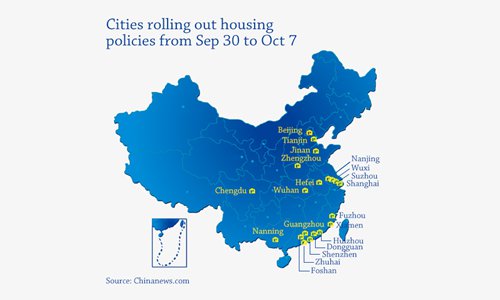
Measures could rein in home prices: experts
China's central bank governor said Thursday that he had noticed the recent rapid increase in housing prices in some Chinese cities, and said the central government attached great importance to the matter and will actively take measures to ensure the sound development of the housing sector.
Experts said the governor's words may signal a gradual policy shift that would curb credit risks in the property sector and prevent a bubble from forming.
Zhou Xiaochuan, governor of the People's Bank of China, made the remarks at a meeting of G20 central bank governors and finance ministers in Washington, US, on Thursday, according to a statement released by the central bank on its official website on Saturday.
In an effort to prevent housing prices from rising too quickly, about 20 Chinese cities - including Beijing, Shanghai, Shenzhen in South China's Guangdong Province, Suzhou in East China's Jiangsu Province, Chengdu in Southwest China's Sichuan Province and Wuhan in Central China's Hubei Province - issued new policies restricting property purchases and mortgage down payments during China's week-long National Day holidays, which ended Friday.
At the G20 meeting, Zhou said that amid the gradual recovery of the global economy, China will control credit growth.
Yan Yuejin, research director at E-house China R&D Institute, said that Zhou could be signaling a tightening of credit growth.
"A tightening would allow ordinary housing demand to be sustained, in that it would channel precious credit into the hands of those who really need it. And at the same time, it could contain speculative demand. The two aspects would both be positive for the economy," Yan told the Global Times on Saturday
Experts said the housing sector plays an important part in the Chinese economy, affecting industries from cement and steel to furniture. But rapid growth in housing loans also builds up credit risks for China's banking system.
Zhang Ning, a research fellow with the National Academy of Economic Strategy at the Chinese Academy of Social Sciences, told the Global Times Saturday that Zhou's remarks reflected a judgment by top Chinese officials regarding the country's macroeconomic situation.
"With a stabilizing economy and a stabilizing financial market, China is now in a position to control credit growth and liquidity and can even moderately tighten its monetary policy. The overheated real estate markets in some Chinese cities in the first half of 2016 also provide a reason for such a move," Zhang said.
Slow it down
China has seen rapid credit growth recently. New yuan-denominated lending in August more than doubled from the month before to 948.7 billion yuan ($145.95 billion), with mortgages representing 55.7 percent of the 529 billion yuan that went toward household loans, the Xinhua News Agency reported Saturday, citing central bank data.
According to a report published on August 31 by the 21st Century Business Herald, which studied the interim reports of 15 listed Chinese banks, housing mortgages accounted for over 2 trillion yuan or 46.58 percent of all the new loans granted in the first half of 2016. In 2015, the figure was just 31.54 percent, the report said.
"The surge in mortgage loans is the result of the sizzling property market in some parts of the country. It spurs GDP growth in the short term, but in the long term it does not lift a country's economy," Zhang noted.
"In limiting credit growth, for example, commercial banks can increase scrutiny in granting loan approvals," Yan said.
He noted that a curb on loans would prevent the bubble in the housing market from growing bigger.
The new measures will help to curb runaway prices in the Chinese housing market in the short term, with prices likely to stabilize over the next six to 12 months, Zhang predicted.
However, it should be noted that the rising proportion of housing loans does not automatically indicate the real estate industry is facing a huge bubble, Zhang said.
"It is a global pattern that as the housing market matures, homebuyers' leverage will generally increase," Zhang noted.
Minister of Finance Lou Jiwei said at the same G20 meeting that China implemented major stimulus policies to cope with the effects of the global financial crisis, and while these measures contributed to growth, they pushed up China's debt level and caused overcapacity.


















































